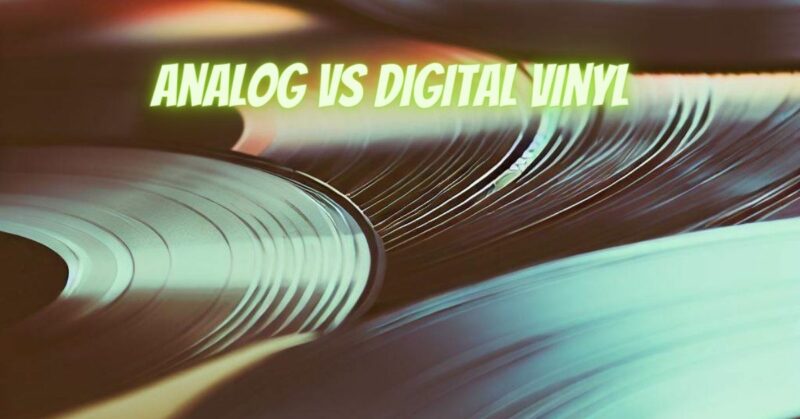Vinyl records have been around for over 100 years, and they continue to be a popular format for listening to music. But what are the advantages and disadvantages of analog vinyl vs. digital vinyl?
Analog Vinyl
Analog vinyl is a physical medium that stores sound waves as a spiral groove on a disc. When the record is played, a stylus (needle) follows the groove and converts the vibrations into an electrical signal that is amplified and sent to speakers.
The main advantage of analog vinyl is that it is a continuous medium. This means that the sound waves are not sampled, but are instead represented as a continuous waveform. This can give analog vinyl a more natural and “warm” sound than digital vinyl.
However, analog vinyl also has some disadvantages. One is that it is a fragile medium. Records can be easily scratched or damaged, which can distort the sound. Another disadvantage is that analog vinyl has a lower dynamic range than digital vinyl. This means that it cannot reproduce the quietest and loudest sounds as well as digital vinyl.
Digital Vinyl
Digital vinyl is a digital representation of an analog vinyl record. The sound waves are sampled and converted into a digital signal, which is then stored on a disc. When the disc is played, the digital signal is converted back into an analog signal and sent to speakers.
The main advantage of digital vinyl is that it is a more accurate representation of the original sound. This is because the digital signal is not subject to the same kind of distortion as the analog signal. Another advantage of digital vinyl is that it is a more durable medium than analog vinyl. Digital discs are less likely to be scratched or damaged than records.
However, digital vinyl also has some disadvantages. One is that it can sound “cold” or “digital” compared to analog vinyl. Another disadvantage is that digital vinyl can have a lower sound quality than high-quality digital formats, such as FLAC or WAV.
| Feature | Analog Vinyl | Digital Vinyl |
|---|---|---|
| Medium | Physical | Digital |
| Sound waves | Continuous | Sampled |
| Dynamic range | Lower | Higher |
| Durability | Less durable | More durable |
| Sound quality | Can sound “warm” or “natural” | Can sound “cold” or “digital” |
So, which is better, analog vinyl or digital vinyl? Ultimately, the answer comes down to personal preference. Some people prefer the warm, natural sound of analog vinyl, while others prefer the accuracy and durability of digital vinyl.
If you are looking for a high-quality audio experience, then digital vinyl is a good option. However, if you are looking for a more immersive and tactile experience, then analog vinyl may be a better choice.
Additional Information
- There are many different factors that can affect the sound quality of vinyl records, including the quality of the recording, the quality of the pressing, and the quality of the turntable and cartridge.
- There is a growing trend of people collecting and listening to vinyl records. This is partly due to the resurgence of interest in vinyl records, but it is also due to the fact that vinyl records can often be found at a lower price than digital albums.
- If you are considering buying a turntable, there are a few things that you should keep in mind. First, you need to decide whether you want a manual or automatic turntable. Manual turntables require you to manually cue the record and adjust the speed, while automatic turntables do this for you. Second, you need to decide what kind of cartridge you want. Cartridges come in a variety of prices and qualities, so you need to decide how much you are willing to spend.


